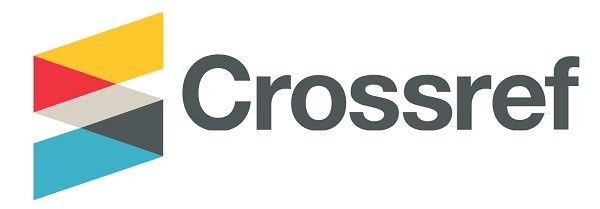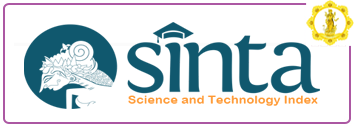Kepercayaan dan Kepuasan Penggunaan LMS Mahasiswa Selama Pembelajaran Daring
DOI:
https://doi.org/10.25078/jpm.v7i2.2349Keywords:
Belief in the use of LMS, Learning management system (LMS), Learning satisfactionAbstract
The implementation of online learning through the Learning Management System (LMS) is universal in higher education. The presentation of learning at the LMS is expected to facilitate student learning during the Covid-19 pandemic. This aims of research to determine the effect of belief in the use of LMS on learning satisfaction in LMS carried out by students. The research approach uses a quantitative type of correlation. This study used a research sample of 101 students. The research instrument is an online questionnaire that has been tested for validity and reliability and is analyzing by regression. The results showed that the regression formulation was: Y = 1.535 + 0.706. Is the influence of the belief variable using LMS significant on LMS learning satisfaction? Result of the regression analysis, the significance value of 0.000 is smaller than 0.05, it can be concluded that belief in the use of LMS affects LMS learning satisfaction. How much trust do the beliefs of LMS affect learning satisfaction at the LMS (r-square), namely 55.8%, while the remaining 44.2% is another variable and is not researched?. Belief in using LMS on learning satisfaction in LMS is based on aspects of content quality, learning success, ease, and behavior.
Downloads
References
Ain, N. U., Kaur, K., & Waheed, M. (2015). The influence of learning value on learning management system use: An extension of UTAUT2. Information Development, 1–16. https://doi.org/10.1177/0266666915597546
Alfan, Z., Astuti, E. S., & Riyadi. (2014). MODEL KEBERHASILAN BELAJAR MAHASISWA MENGGUNAKAN LEARNING MANAGEMENT SYSTEM (Studi pada Mahasiswa S1 Program Teknologi Informasi dan Ilmu Komputer Universitas Brawijaya Angkatan 2012). Jurnal Administrasi Bisnis S1 Universitas Brawijaya, 14(2), 84459.
Arlinwibowo, J., Retnawati, H., Kartowagiran, B., & Kassymova, G. K. (2020). Distance learning policy in Indonesia for facing pandemic COVID-19: School reaction and lesson plans. Journal of Theoretical and Applied Information Technology, 98(14), 2828–2838.
Bibi, S., & Jati, H. (2015). Efektivitas model blended learning terhadap motivasi dan tingkat pemahaman mahasiswa mata kuliah algoritma dan pemrograman. Jurnal Pendidikan Vokasi, 5(1), 74. https://doi.org/10.21831/jpv.v5i1.6074
Cavus, N., & Alhih, M. S. (2014). Learning Management Systems Use in Science Education. Procedia - Social and Behavioral Sciences, 143(February 2014), 517–520. https://doi.org/10.1016/j.sbspro.2014.07.429
Christian, L., Permatasari, A., & Sugandi, L. (2014). Terhadap Kepuasan User Dalam Proses Belajar Mengajar Pada Universitas Di Jakarta. 776 ComTech, 5(2), 775–785.
Conde, M. Ã., GarcÃa-Peñalvo, F. J., RodrÃguez-Conde, M. J., Alier, M., Casany, M. J., & Piguillem, J. (2014). An evolving Learning Management System for new educational environments using 2.0 tools. Interactive Learning Environments, 22(2), 188–204. https://doi.org/10.1080/10494820.2012.745433
Diana, N., Walidain, S. N., & Rahman, A. H. (2018). Integrasi Learning Management System ( LMS ) dan Simulasi PhET pada Pembelajaran Fisika Terhadap Keterampilan Proses Sains. QUARK: Jurnal Inovasi Pembelajaran Fisika Dan Teknologi, 1(1), 36–40.
Eom, S. B. (2014). Understanding e-learners’ satisfaction with learning management systems. Bulletin of the Technical Committee on Learning Technology, 16(2–3), 10–13.
Fitriani, Y. (2020). Analisa Pemanfaatan Learning Management System (Lms) Sebagai Media Pembelajaran Online Selama Pandemi Covid-19. Journal of Information System, Informatics and Computing, 4(2), 1–8.
Gunawan, G., Sahidu, H., Susilawati, S., Harjono, A., & Herayanti, L. (2019). Learning Management System with Moodle to Enhance Creativity of Candidate Physics Teacher. Journal of Physics: Conference Series, 1417(1), 0–6. https://doi.org/10.1088/1742-6596/1417/1/012078
Hakim, M., & Mulyapradana, A. (2020). Pengaruh Penggunaan Media Daring dan Motivasi Belajar Terhadap Kepuasan Mahasiswa Pada Saat Pandemik Covid-19. Widya Cipta: Jurnal Sekretari Dan Manajemen, 4(2), 154–160. https://doi.org/10.31294/widyacipta.v4i2.8853
Janson, A., Leimeister, J. M., & Sollner, M. (2017). Individual Appropriation of Learning Management Systems—Antecedents and Consequences. Transactions on Human — Computer Interaction Research, 9(3), 173–201.
Juhary, J. (2014). Perceived usefulness and ease of use of the learning management system as a learning tool. International Education Studies, 7(8), 23–34. https://doi.org/10.5539/ies.v7n8p23
Kakasevski, G., Mihajlov, M., Arsenovski, S., & Chungurski, S. (2008). Evaluating usability in learning management system moodle. Proceedings of the International Conference on Information Technology Interfaces, ITI, May 2014, 613–618. https://doi.org/10.1109/ITI.2008.4588480
Kalloo, R. C., Mitchell, B., & Kamalodeen, V. J. (2020). Responding to the COVID-19 pandemic in Trinidad and Tobago: challenges and opportunities for teacher education. Journal of Education for Teaching, 46(4), 452–462. https://doi.org/10.1080/02607476.2020.1800407
Kamarga, H. (2018). Constructing Online Based History Learning: Comparison of Learning Content Management System (LVCMS) To Learning Management System (LMS). Historia: Jurnal Pendidik Dan Peneliti Sejarah, 12(2), 255. https://doi.org/10.17509/historia.v12i2.12105
Kisanjara, S., Tossy, T., Sife, A., & Msanjila, S. (2017). An Integrated Model for Measuring the Impacts of E-Learning on Students’ Achievement in Developing Countries. International Journal of Education and Development Using Information and Communication Technology, 13(3), 109–127.
Kumalasari, D., & Akmal, S. Z. (2020). Resiliensi akademik dan kepuasan belajar daring di masa pandemi COVID-19: Peran mediasi kesiapan belajar daring. Persona:Jurnal Psikologi Indonesia, 9(2), 353–368. https://doi.org/10.30996/persona.v9i2.4139
Larasati, N. A., & Andayani, S. (2019). Pengaruh Penggunaan Learning Management System (LMS) Terhadap Tingkat Kepuasan Mahasiswa Menggunakan Metode DeLone and McLean. Jurnal Teknik Informatika UNIKA Santo Thomas, 4(1), 13–20.
Lopes, A. P. (2014). Mobile Learning Management Systems in Higher Education. Virtual Learning Environments, July 2014, 1249–1264. https://doi.org/10.4018/978-1-4666-0011-9.ch608
Magno, C. (2017). Facilitating Student Learning in Schools through a Learning Management System: An Action Research. The International Journal of Research and Review, 12(April).
Mohammadi, M. K., Mohibbi, A. A., & Hedayati, M. H. (2021). Investigating the challenges and factors influencing the use of the learning management system during the Covid-19 pandemic in Afghanistan. In Education and Information Technologies (Issue 0123456789). Springer US. https://doi.org/10.1007/s10639-021-10517-z
Mtebe, J. S., & Raisamo, R. (2014). A model for assessing learning management system success in higher education in sub-saharan Countries. Electronic Journal of Information Systems in Developing Countries, 61(1). https://doi.org/10.1002/j.1681-4835.2014.tb00436.x
Munir, M. (2010). Penggunaan Learning Management System (Lms) Di Perguruan Tinggi: Studi Kasus Di Universitas Pendidikan Indonesia. Jurnal Cakrawala Pendidikan, 1(1), 109–119. https://doi.org/10.21831/cp.v1i1.222
Naveh, G., Tubin, D., & Pliskin, N. (2012). Student Satisfaction with Learning Management Systems : A lens of critical. Technology, Pedagogy and Education, 21(3), 337–350. https://doi.org/10.1080/1475939X.2012.720413
Nilayani, S. A. P. (2020). Survei Kepuasan Siswa Terhadap Proses Belajar Daring Selama Pandemi Covid-19. Cetta: Jurnal Ilmu Pendidikan, 3(3), 453–462. http://jayapanguspress.penerbit.org/index.php/cetta
Ohliati, J., & Abbas, B. S. (2019). Measuring students satisfaction in using learning management system. International Journal of Emerging Technologies in Learning, 14(4), 180–189. https://doi.org/10.3991/ijet.v14.i04.9427
Pertiwi, N., Saud, U. S., & Saffitri, Y. N. V. (2020). Utilization of the WhatsApp-Based Internet for Elementary School Students during the Covid-19 Pandemic. The 3rd International Conference on Elementary Education (ICEE 2020), 3(November), 126–132.
Prasetyo, T., Widyasari, & Hartono, R. (2016). Pengembangan Inovasi Pendidikan Melalui Blended Learning. Didaktika Tauhidi, 4(2).
Rafi, I., Nurjannah, F. F., Fabella, I. R., & Andayani, S. (2020). Peluang dan Tantangan Pengintegrasian Learning Management System (LMS) dalam Pembelajaran Matematika di Indonesia. Jurnal Tadris Matematika, 3(2), 229–248. https://doi.org/10.21274/jtm.2020.3.2.229-248
Rahim, R. B. A., & Razak, F. Z. A. (2021). The impact of system quality on satisfaction to use learning management system: E-campus perspective. Journal of Physics: Conference Series, 1793(1). https://doi.org/10.1088/1742-6596/1793/1/012021
Rhode, J., Richter, S., Gowen, P., Miller, T., & Wills, C. (2017). Understanding faculty use of the learning management system. Online Learning Journal, 21(3), 68–86. https://doi.org/10.24059/olj.v%vi%i.1217
Santiago, B. J., RamÃrez, J. M. O., RodrÃguez-Reséndiz, J., Dector, A., GarcÃa, R. G., González-Durán, J. E. E., & Sánchez, F. F. (2020). Learning management system-based evaluation to determine academic efficiency performance. Sustainability (Switzerland), 12(10), 1–17. https://doi.org/10.3390/su12104256
Shakerian, S., Noori, S., Hiedarpoor, P., Shams, L., & Hosseinzadeh, M. (2021). Developing a Web-Based Learning Management System (LMS) for Master’s Thesis Process in the Shahid Beheshti University of Medical Sciences. Journal of Medical Education, 19(4), 1–9. https://doi.org/10.5812/jme.110696
Shayan, P., & Iscioglu, E. (2017). An Assessment of Students’ Satisfaction Level from Learning Management Systems: Case Study of Payamnoor and Farhangian Universities. Engineering, Technology & Applied Science Research, 7(4), 1874–1878. https://doi.org/10.48084/etasr.1041
Song, Y. N., & Luan, Z. Q. (2020). Function Design Optimization of Learning Management System (LMS) Based on Student Perspective-Case Study of Canvas Application University of Colorado Denver. Journal of Physics: Conference Series, 1621(1). https://doi.org/10.1088/1742-6596/1621/1/012058
Tawalbeh, T. I. (2017). EFL Instructors’ Perceptions of Blackboard Learning Management System (LMS) at University Level. English Language Teaching, 11(1), 1. https://doi.org/10.5539/elt.v11n1p1
Triyana, I. G. N., Sri Ratmini, N. K., Mandra, I. W., & Ruscitadewi, N. W. (2019). The Use Of Moodle-Based E-Learning In Evaluating Students’ Learning. Jurnal Penjaminan Mutu, 5(2), 165. https://doi.org/10.25078/jpm.v5i2.1089
Wagimin, I., Patni Ninghardjanti, & Kristiani. (2014). Model Kesuksesan Pembelajaran Dengan E-Learning Di Perguruan Tinggi. Jurnal Penelitian Pendidikan INSANI, 16(1), 23–35.
Wiratomo, Y., & Mulyatna, F. (2020). Use of Learning Management Systems in Learning Efforts during a Pandemic. Journal of Mathematical Pedagogy (JoMP), 1(2), 62–71.
Xu, H., & Mahenthiran, S. (2016). Factors that Influence Online Learning Assessment and Satisfaction: Using Moodle as a Learning Management System. International Business Research, 9(2), 1. https://doi.org/10.5539/ibr.v9n2p1
Yuen, A. H. K., Cheng, M., & Chan, F. H. F. (2019). Student satisfaction with learning management systems: A growth model of belief and use. British Journal of Educational Technology, 50(5), 2520–2535. https://doi.org/10.1111/bjet.12830
Zainal, A., Tampubolon, T. A. M., Herliani, R., & ... (2021). … Pembelajaran Daring (SIPDA) as an Online Learning Management System on Learning Outcomes of Financial Accounting Subject: A Mediation Effect of Learning …. … on Strategic Issues …, 163(ICoSIEBE 2020), 327–331. https://www.atlantis-press.com/proceedings/icosiebe-20/125953011









